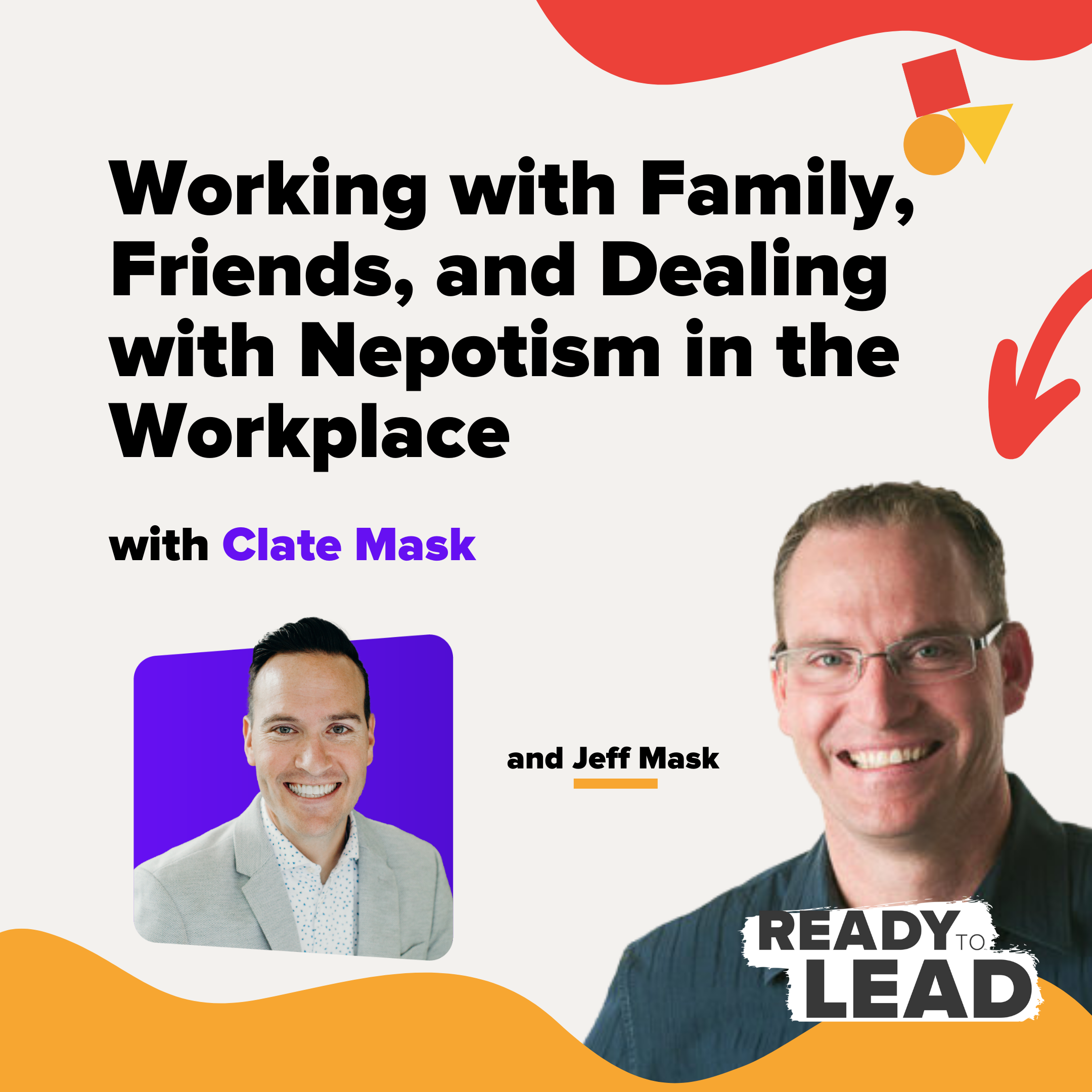You want to hire people you know, love, and trust, and quite often those are friends and family members, but how do you avoid favoritism and nepotism?
On today’s episode, host Jeff Mask is joined by his brother, Clate Mask, CEO and co-founder of Keap (formerly known as Infusionsoft), a sales and marketing automation platform. Clate loves entrepreneurs and has great respect for the grit and tenacity and perseverance they show as they build their businesses. He built a company that helps entrepreneurs overcome the challenges and frustrations that go with the territory. Automation helped him and his business, and now he shares it with others.
Clate and Jeff have a lot of experience working together in multiple companies over the years. They’ve seen what works really well and what can be really painful, creating family strife.
So how do you work with family and friends? How do you lead through nepotism and favoritism? How do you avoid those horror stories we all hear about when family members work together and end up ruining their relationships outside of the office?
Listen in for some encouraging stories and practical tips—all born from years of experience, both good and bad.
What NOT to Do When Working with Family
Years ago, during the dotcom era, Clate was Jeff’s boss in a company he didn’t own. It was a lot of fun, and they learned a lot. Jeff is six years younger than Clate and idolized him. They had a good relationship, but as Jeff started tasting success, he got prideful, and Clate would try to keep him in his place. Clate had the mental game and knew how to push Jeff’s buttons. Both of their weaknesses came out.
Their company had a ping pong table where they’d play lunch tournaments. Clate won 95% of the time, because of his skill and mental edge. They always played best of three. One day, they had each won one game, and Jeff was one point away from winning game three. He smashed it and won. An employee had walked behind Clate at just that moment, and Clate slammed the paddle down and said, “If you want to win that way, sure.”
They replayed the point. Clate won and gloated, and 21 years of little brother exploded inside Jeff. He lost it, started swearing, and they were yelling at each other, totally embarrassing themselves. They went back to work and kept fighting over Instant Messenger.
Learning From Their Failures
They eventually got over it and healed. Fast forward. Clate started a new company with two of his brothers-in-law. Jeff could have joined but didn’t want to mess up their relationship. Jeff went out on his own and found success. After two kids and a cancer diagnosis, he wanted to find purpose and vision in business. At the same time, Clate was looking for a Jeff Mask in his company and thought, shoot, we just need Jeff Mask.
Jeff was hesitant at first, because he really didn’t want to risk ruining a family relationship he treasured. But he and Clate sat down for a ground rule-setting conversation at the very beginning. They knew they had to be intentional, and they were. They set ground rules for what they would be and not be. They decided together that they would avoid these three things at all costs:
- greed
- pride
- laziness
And they would make sure they demonstrated:
- selflessness
- humility
- grit
There were certain standards Jeff had to meet, results he had to get, and if he didn’t measure up, they agreed Clate would fire him. Clate told Jeff “I don’t want you to be my younger brother. Just be my brother.” He had matured and was no longer trying to hold a psychological edge. He said it was having two sons of his own that opened his eyes and caused him to reflect. He watched their older/younger brother dynamic, and his heart went out to the younger brother.
Some Practical Tactical Things To Consider
The perception of nepotism is worse than nepotism, but you have to deal with it. Nepotism and favoritism are real, but it doesn’t mean you can’t hire friends and family. You just need those ground rules, clarity, and core values, so we can have awesome relationships. You’ve got to practice open communication, confront issues, and put your relationships above the business.
That doesn’t mean that, because of our relationships, a friend or family member can do whatever they want in the business. It means that, if we part ways in the business, our relationship is stronger than that and won’t be destroyed. It means saying I love you more than I love the business. We might not be working together at some point, but my love and care for you is greater.
Sometimes the business requires you to let go of family/friends, even when it’s hard. Don’t hire anybody that you can’t fire. Two of Clate’s brothers-in-law founded the company with Clate, and the younger brother, Brad, worked for them. Over time, Clate knew he had to let him go. The brothers (and Clate’s wife) pleaded with him not to do it, but he did. They went a year or more where family gatherings were really hard, especially for Brad’s wife and Clate’s wife. Clate told Brad his life would be better when he moved on, so he could be a business owner. When he got his own business going, he realized it was the best thing that could have happened to him. But it sucked for over a year. The leader has to have the courage and conviction to do what’s right for the business and love the family member.
If you’re a family member, the bar of performance is higher. You have to be a star, or it will be “that’s just because he’s a family member.” Clate has two sons in the business right now, and the bar is higher for them. You have to push yourself to be great. Results will calm all concerns. When the family member does well, people will know.
As your company gets bigger, try to avoid having family members report to each other. The company runs better that way. Guard yourself on favoritism. Don’t show lesser trust with others. Give them a chance too. You can’t have courage/conviction and not love. And you can’t have love and not courage/conviction. It’s both/and.
A Happy Ending
Jeff joined Infusionsoft (now Keap) before any outside capital came in, and it was bringing in $3 million a year. When he left 11 years later, they were north of $100 million. Jeff and Clate remember Jeff’s exit interview well. They had the conversation, and there was some deep emotion happening. Clate’s office has a glass door, and Jeff knew three things:
- He was about to cry.
- Everyone could see him.
- He didn’t care.
Clate and Jeff cried and hugged for a long time. They just couldn’t get over the amazing fact that 11 years earlier they had committed to each other to not be proud, selfish, or lazy, and they did it. And their relationship was stronger and more powerful than ever. It was hard work to do that. But it can be done.
They went their separate ways four years ago and remain best friends. Even if you don’t work with family or friends, these core values are still powerful. You don’t have to be a statistic in the horror stories of working with family. But it takes intentionality and ground rules and open communication. It takes courage and humility and love.
Richard and Jeff want to hear from YOU. Did something in today’s episode resonate with you? Anything you disagreed with? What experiences do you have to share about nepotism in the workplace? They’d love to hear your feedback on this episode. Email them here with your thoughts/questions: feedback@readytolead.com
LINKS AND RESOURCES:
OTHER SHOWS YOU MIGHT ENJOY:
- Business Lunch with Roland Frasier and Ryan Deiss
- Perpetual Traffic with Ralph Burns and Kasim Aslam
- DigitalMarketer Podcast with Mark de Grasse and Mandy McEwen


